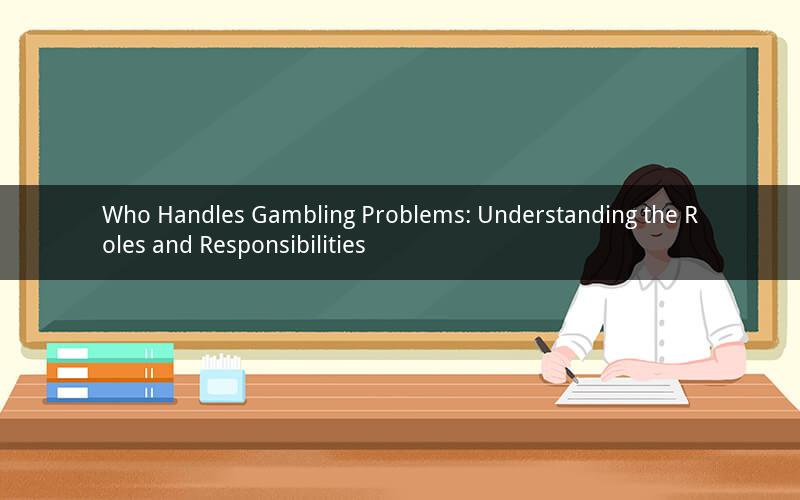
Introduction:
Gambling problems are a significant concern worldwide, affecting individuals, families, and communities. Identifying who handles gambling problems is crucial in providing appropriate support and resources. This article explores the various entities responsible for addressing gambling issues, their roles, and the collaborative efforts in place.
1. Governments and Regulatory Bodies:
Governments play a pivotal role in regulating and overseeing gambling activities. They establish laws and regulations to protect consumers, prevent addiction, and ensure fair play. Regulatory bodies, such as the Gambling Commission in the United Kingdom or the Nevada Gaming Control Board in the United States, are responsible for licensing and monitoring gambling operators. These entities enforce regulations, investigate complaints, and take action against operators that violate the law.
2. Health and Mental Health Professionals:
Health professionals, including psychologists, counselors, and therapists, are instrumental in addressing gambling problems. They provide counseling, therapy, and support to individuals struggling with gambling addiction. These professionals utilize evidence-based treatment approaches, such as cognitive-behavioral therapy (CBT) and motivational interviewing, to help individuals overcome their addiction. They also collaborate with other professionals to develop comprehensive treatment plans tailored to individual needs.
3. Non-Governmental Organizations (NGOs):
NGOs play a crucial role in raising awareness about gambling problems and providing support to affected individuals and their families. Organizations like Gamblers Anonymous (GA) and Gamblers Help provide peer support groups, counseling services, and educational resources. These NGOs work towards prevention, intervention, and recovery by promoting responsible gambling and advocating for policy changes that protect vulnerable populations.
4. Gaming Operators and Industry Associations:
Gaming operators have a responsibility to promote responsible gambling practices and address gambling problems. Many operators implement self-exclusion programs, where individuals can request to be banned from their establishments. Industry associations, such as the International Association of Gaming Regulators (IAGR) and the European Gaming and Betting Association (EGBA), work to establish industry-wide standards and best practices. These organizations also provide training and resources to operators to identify and assist individuals with gambling-related issues.
5. Community-Based Organizations:
Community-based organizations, including local support groups and community centers, play a vital role in addressing gambling problems at the grassroots level. These organizations offer various programs and initiatives aimed at raising awareness, providing support, and promoting responsible gambling within their communities. They collaborate with local authorities, NGOs, and other stakeholders to create a supportive environment for individuals affected by gambling problems.
6. Collaboration and Partnerships:
Addressing gambling problems requires a collaborative approach involving various stakeholders. Governments, regulatory bodies, health professionals, NGOs, gaming operators, and community-based organizations work together to develop comprehensive strategies and interventions. Collaboration includes sharing data, resources, and expertise to enhance prevention, intervention, and recovery efforts. International organizations, such as the World Health Organization (WHO) and the United Nations Office on Drugs and Crime (UNODC), also play a role in promoting global collaboration and best practices.
Frequently Asked Questions:
Q1: What are the signs of a gambling problem?
A1: Signs of a gambling problem include an inability to control gambling behavior, preoccupation with gambling, lying or hiding gambling activities, neglecting responsibilities, increased financial stress, and experiencing emotional or physical health issues due to gambling.
Q2: Can gambling addiction be treated?
A2: Yes, gambling addiction can be treated. Effective treatment approaches include therapy, counseling, support groups, and lifestyle changes. Treatment plans are tailored to individual needs and may involve a combination of these interventions.
Q3: How can I help someone with a gambling problem?
A3: You can help someone with a gambling problem by expressing concern, offering support, and encouraging them to seek professional help. It's important to approach the situation with empathy and understanding, rather than judgment or criticism.
Q4: Are there any legal measures to prevent gambling addiction?
A4: Yes, governments and regulatory bodies have implemented various legal measures to prevent gambling addiction. These measures include age restrictions, self-exclusion programs, and limits on betting amounts and time spent gambling. Additionally, responsible gambling campaigns and education programs are aimed at raising awareness and promoting responsible gambling practices.
Q5: Can technology help in addressing gambling problems?
A5: Yes, technology can play a significant role in addressing gambling problems. Online gambling operators can implement tools such as deposit limits, time-out features, and self-exclusion options to help individuals manage their gambling behavior. Additionally, mobile apps and online resources provide support, counseling, and educational information to individuals struggling with gambling addiction.
Conclusion:
Addressing gambling problems requires a collaborative effort involving governments, health professionals, NGOs, gaming operators, and community-based organizations. By understanding the roles and responsibilities of these stakeholders, we can work towards preventing gambling addiction, providing appropriate support, and promoting a healthier society.